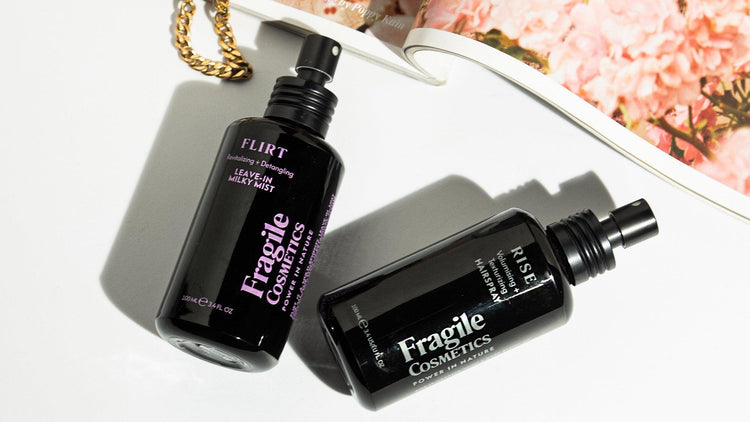Discover them:
Clean in moderation, without delipidating
Here begins the common thread of your maxi-comfort routine: restoring, then maintaining the integrity of your skin barrier. If you have sensitive or sensitized skin, it must have been damaged. However, this shield is a bit like the border post of your skin ecosystem: nothing goes in and nothing comes out without its consent. This concerns pathogenic organisms, irritating pollutants, but also hydration, which quickly evaporates if your hydrolipidic film is compromised.
In the morning, we abandon all sulfated surfactants, too strong for our battered skin... and a little irrelevant when we wake up. As sensitive skin doesn't like too much water, try alternating between an alcohol-free lotion - like Aloe + Immortelle Odacité mist (immortelle is your best friend!) and a gentle cleanser such as the one with gluconate from zinc from Umaï , which has a neutral pH.
In the evening, if you are wearing makeup, use its big brother instead: La Nuit Lactée makeup remover. It contains several generous sources of omega-6, essential fatty acids that our skin needs to protect itself from various external aggressions. Effective even on waterproof makeup, it is nonetheless formulated without perfume and does not sting the eyes.
The added tip: forget the sponge towels, wipe your freshly cleansed skin with a tissue (by patting, without rubbing).
Moisturize generously, morning and evening
We continue straight away with the essential step: hydration. Using a day cream remains essential in your routine for sensitive skin, because it combines the best of both worlds: water and oil. Its hygroscopic ingredients attract water to the surface and soothe minor skin discomforts, while its oily phase strengthens your skin barrier against external stress factors. The key is to choose your cream carefully, avoiding long lists.
During the day, choose rich, well-covering textures that will “mimic” your hydrolipidic film. Our choice: Q+A natural ceramides cream. Why she ? Because ceramides are natural constituents of your skin barrier: they are simply essential ingredients for sensitive skin. In addition, it is alcohol and perfume free.
At bedtime, it may be interesting to pamper your surface microbiota with probiotics, especially if your skin shows redness or recent signs of stress. To do this, apply a dab of Culture d'Antipodes gel cream to your cleansed and/or cleansed skin. Its mix of “good bacteria” and mamaku supports the repair of the epidermis.
The added tip: in case of “skin in crisis”, swap your usual cream for Holidermie’s REPAIR absolute balm . It is formulated with arnica, hyaluronic acid and niacinamide to instantly and lastingly comfort weakened skin.
Add a (final) layer of oil
This is a tip that is too often ignored, but very effective in cases of dry or delicate skin. The principle is to apply an oil to your face as the last step of your routine to “seal” the hydration that you have just provided with your cream. To illustrate: if you pour water and oil into a glass, you will see that the oil will form a film on the surface and that the water trapped below will have a much harder time evaporating. This is exactly what we want!
To stay in the minimalist vein, perfectly suited to sensitive skin, opt for Indie Lee's squalane oil. As its name suggests, it contains only one ingredient: squalane, an oily substance derived from olive oil. It has the advantage of having a non-greasy feel and lightning penetration power which recalls the good sides of conventional silicones.
If you have skin that is starting to show signs of aging, or even scars, turn to Merme wild rose oil. It also contains only one ingredient: cold-pressed rosehip vegetable oil from organic farming. This pure treasure of nature has long been renowned for its restorative, regenerating and antioxidant properties.
The added tip: don't forget to apply sunscreen to protect your sensitive skin from the harmful effects of UV rays (which irritate your skin). Inorganic filters based on non-nano zinc oxide (e.g. Time Traveler from Solara ) are generally better tolerated by reactive skin.
Our ultimate tips for soothing your sensitive skin
- Beauty starts from within: watch your diet. Moderate your consumption of foods known to be inflammatory, such as sugar, meat and dairy products. Also relax on alcohol, coffee and tobacco, which maintain inflammatory phenomena.
- You can integrate into your routine a food supplement that targets redness and skin sensitivities, such as the cult French Glow from Aime .
- Avoid massages, saunas, scrubs, hammams… in short, anything that could lead to excessive vasodilation.













